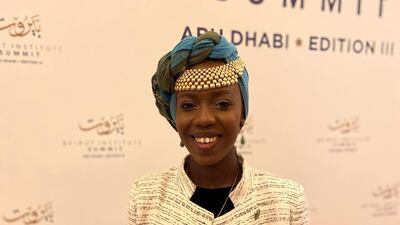Last week, Emi Mahmoud turned 26. Throughout the Sudanese-American poet and former refugee's life, the world has been witness to many atrocities: the Rwandan genocide, the Darfur genocide, the Second Gulf War and the Syrian civil war, to name a few.
Speaking to The National in Abu Dhabi before receiving an award at a gala dinner, she reminds us that if she has seen all of that, "imagine what it is like for people in their fifties who are carrying children across borders".
Last year, Mahmoud released her first poetry collection, Sisters' Entrance. She was also appointed as a UNHCR Goodwill Ambassador, a role she uses to help raise awareness about refugees. This year, she is getting ready to go into a studio to make an audio recording of her book, a project that is expected to be out by next spring.
"I think the reason that I write and the reason that I speak are different," she says on the eve of a gala event in the capital, where she was recognised for her advocacy work by the Beirut Institute Summit. "I write to actually cope with a lot of what happened and to engage with what I'm seeing and what I'm witnessing and what people are sharing with me. I speak because people need to hear it."
Mahmoud was a baby when her parents fled the war in Darfur. Growing up, she used poetry to speak publicly about Darfur and to draw on her own refugee experience, which is why the work she is doing with the UNHCR is important to her. She says that her role as an ambassador with the programme has taken her to the Greek island of Lesbos, Kenya, Uganda and Jordan, as well as Sudan.
"A lot of people, when they talk about refugees they talk about it as a crisis moment and they talk about the breaking moment, but they don't talk about long-term solutions and sustainable peace and sustainable solutions," she says. "I love those instances when I go into the field because not only do I get to speak to people on the front lines of the work, but I also get to learn about the operation in the field and I get the privilege of talking to the people who have been on this arduous journey of getting away and making it to safety."
The spoken word poet says a lot of these experiences find their way into her work. "I think a lot of it seaps into my work because I write what I feel," she says. "I share because I think it will help other people cope."
Mahmoud says she writes because she is also still coping with what she has been through herself. "I learnt very early on that even though my poetry might mean one thing to me, it will mean something different to everyone who hears it and it's going to resonate in different ways," she says.
She is currently trying to focus more on writing. One of her upcoming projects will be a memoir that chronicles the first seven years of her life. “I’m writing a little bit about my life and my history,” she says. “I’m actually excited to write other kinds of art.”


